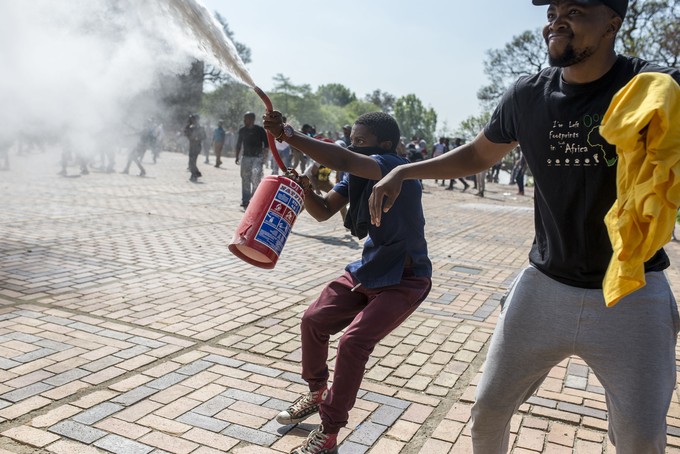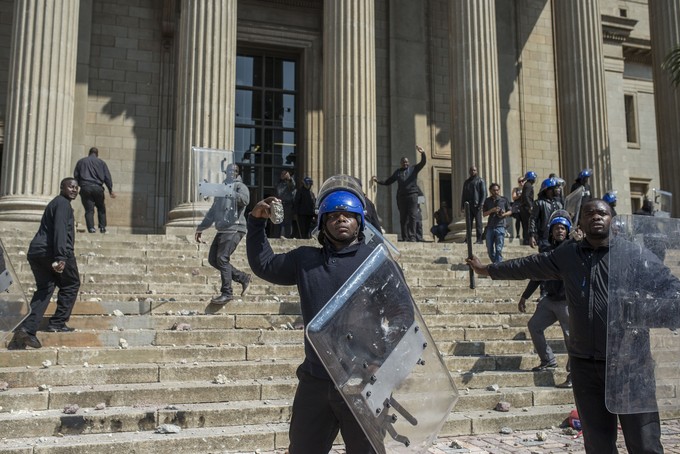Wits: The Assembly that wasn’t (or perhaps was)
Why an apparent consensus between management and Fallists broke down
One of two things happened at Wits on Friday. Either:
-
A much anticipated university General Assembly, which many hoped would resolve the university’s ruinous confrontation over university fees, was waylaid in the wee hours by new and impossible-to-meet demands issued by Fees Must Fall (FMF) militants. Recognising the absence of the consensus that they hoped to see affirmed before the world in a marquee on the Library Lawn, university negotiators decided to postpone the event. A semi-circle of exhausted university higher-ups, led by Vice Chancellor Adam Habib, announced the postponement at a 9am press conference
Or:
-
University management decided, without warning and following little by way of preparatory consultation with students for the event, to pull out of the university assembly it had agreed to a few days earlier. Left high and dry by another episode of the vice-chancellor’s preference for communicating via the media rather than directly with his own students, the FMF people, together with sympathetic academics, occupied the marquee and held the assembly anyway, minus management. There they explained to the hundreds gathered how management – in particular the “criminal Habib” – had betrayed their agreement and condemned the university to further confrontations.
So what do we know?
We know that on Tuesday Habib tried to reopen the university to teaching after almost two weeks of closure in the hope of enabling Wits’s 37,000 students to complete the 2016 academic year.
We know that FMF students would have none of this – that they were determined to keep the university shut until a string of demands on the university and government had been met.
We know too that the university brought private security guards and police onto campus, and that security forces were instructed to, if necessary, initiate action to prevent further coercive disruption of classes by what a management-run poll the previous week had indicated to be a minority of students.
We know security duly did initiate action – to prevent gatherings on the Piazza in front of the Central Block, and to stop marchers from West Campus crossing Yale Road to reach East Campus. They fired stun grenades, tear gas and eventually, rubber bullets. Students threw stones, some of which private security threw back at them.
Following this confrontation, in which miraculously only relatively minor injuries were suffered, an impressive phalanx of past Students’ Representative Councils and Black Student Society presidents, led by the EFF’s Advocate Dali Mpofu, interposed themselves into the confrontation as ‘mediators’. After seeking a student mandate they joined in negotiations with management. From these late night negotiations there emerged the plan for a university General Assembly.
The assembly had been pushed for by FMF activists as an allegedly more constitutional and democratic alternative to the supposedly ‘illegitimate’ poll that university management had conducted the previous week. It is not clear whether the two parties understood the assembly’s intended function in the same way.
Management was clear that this was not to be a deliberative assembly, but the culmination of a process of mediation and pre-agreement on a unifying resolution. The large assembly was not suitable as a deliberating venue: it would be impossible for management to negotiate with hundreds of people, and Habib was likely chastened by an incident last year where he and other senior officials were pressured to sit down with a student crowd overnight and not permitted to speak. Assemblies have always functioned for Wits as opportunities for grand collective statements by the university community.
FMF militants thought of the assembly as a forum of some kind, one in which new demands could be made and debated and a consensus forged (or forced) amidst competing views. In this sense the assembly would be in some continuity with the FMF’s own longstanding internal practice of making or ratifying decisions by acclamation in rumbustious mass meetings.
We know, too, that a programme was publicised, and that there was a draft pledge in circulation prior to the event. According to this pledge, the university agreed to commit itself to join students in campaigning for free higher education as well as much enhanced funding for straitened universities.
We know that the pledge did not meet full agreement with the students. What is difficult to say is how much of it the students signed up to and whether and when they changed their minds. Some movement-sympathetic academics have conceded that the FMF activists shifted the goal posts at the last minute to insist on a management-endorsed total shutdown of the university until such time as the government legislated “free, quality and decolonised education”.
The so-called mediators, who did not by the way hide their pro-FMF sympathies, but nevertheless offered to place their political capital at the service of finding a way forward, apparently insisted that the student demands were more flexible than the management narrative allowed, and that the failure to find agreement was management’s fault.
Objectivity seems an unattainable commodity in what has become a deeply polarised university community. Which of these antagonistic accounts one believes will be influenced by one’s more general understanding of the roles played by university managements and fallists over the last couple of years.
If you are convinced of the essential nobility of the fallist cause, you will be inclined to see only passionately idealistic young people fighting on behalf of financially hard-pressed and excluded students, and battling an unresponsive ‘neo-liberal’ management determined to militarise campuses in order to suppress legitimate demands.
Some of a more sceptical ilk see a student movement caught up in an ideological and millenarian fever, determined to seize this opportunity to prosecute a larger revolution against Mandela’s rainbow nation and constitutional democracy, and ready to drag their fellow students into the revolution by any means necessary, including through the employment of violence and threats.
If one of the former, you will likely blame the escalation of violence on the allegedly provocative presence and excesses of security forces. If one of the latter, you might see violent escalation as built into the logic of the student movement’s impossible demands, coercive methods, internal factional competition to prove radical mettle and refusal to elect leaders who can deliver constituencies to rational deals.
And if you are a movement enthusiast you will be inclined to blame management for torpedoing the last-chance General Assembly; if a movement sceptic, you may sympathise with a sleep-deprived Senior Executive Team worn down by unappeasable opponents.
Objectivity, I said, is hard to find in this swirl: so I will not, in the end, pretend to it. I tend towards a more sceptical view of the movement as it has evolved. Fallism has always been a fascinating mix of things, with much of importance to say – not only about the unaffordability of university to many qualified students but about syllabi stuck in Occidental mindsets and academic elites whose multiracialisation is proceeding too slowly.
But I have also seen negative elements from the get-go, and some of these have become more apparent. They include a far too ready resort to coercive tactics, inflexible maximalism in demand-making, an intolerance of differing views, inflammatory nativist rhetoric and an alarming disdain for South Africa’s post-1994 democratic achievement.
Regarding what actually happened in the run-up to the cancelled assembly, I find management’s account the more credible. Anyone who has personally had to deal with fallist demands knows how slippery these can be. I attach a lot of weight to the observations of individuals sympathetic to fallism who concede – whether despairingly or insouciantly – that the fallists reneged on a co-authored agreement, just as they reneged on an earlier one not to disrupt academic preparations on Monday.
Whether that is to be put down to a necessary tactical agility or condemned as bad faith – that remains a matter of one’s overall political perspective. The facts on this specific occasion seem to be as described by management.
Views expressed are not necessarily GroundUp’s.
See also:
- Wits Executive: General Assembly postponed
- Wits SRC: List of demands (Facebook)
- Wits SRC: Response to postponement of general assembly (Facebook)
- Wits Executive: Clarifying the chain of events as they occurred on Friday

Support independent journalism
Donate using Payfast

Letters
Dear Editor
If Daryl Glaser's conclusion is right - and I believe it is - one has to ask what this means.
Fees Must Fall has degenerated into an irrational and destructive 'movement'. It is holding the whole of Wits ransom to a demand that by definition cannot be met by the University. And it is doing so by means of demagoguery and intimidation.
This is profoundly undemocratic, and not only because of FMF's unwillingness to accept the wishes of the majority of Wits students to continue their studies. It is also because the movement seems unable to accept that in the real world, a commitment to free tertiary education simply cannot be made immediately.
Apart from this, the concept of free education for all (and not for those who cannot afford it) is morally questionable. It will clearly benefit the rich more than it benefits the poor. It will also reduce the university's independence, for the simple reason that it will then have to rely much more strongly on the resources government is able, and willing, to provide.
© 2016 GroundUp. 
This article is licensed under a Creative Commons Attribution-NoDerivatives 4.0 International License.
You may republish this article, so long as you credit the authors and GroundUp, and do not change the text. Please include a link back to the original article.

